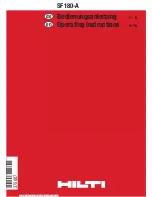
30
Getting To Know Your Drill Press (continued)
- Use the spindle speed recom-
mended for the specific operation
and workpiece material - check the
inside of the belt guard for drilling
information; for accessories, refer
to the instructions provided with
the accessories.
• Never climb on the drill press table,
it could break or pull the entire drill
press down on you.
• Turn the motor switch off and put
away the switch key when leaving
the drill press.
• To reduce the risk of injury from
thrown work or tool contact, do not
perform layout, assembly or setup
work on the table while the cutting
tool is rotating.
• Don’t overreach. Keep proper foot-
ing and balance at all times.
• Maintain tools with care. Keep tools
sharp and clean for best and safest
performance. Follow instructions for
lubricating and changing accesso-
ries.
Use Only Accessories Designed For This Drill Press To Reduce
the Risk of Serious Injury From Thrown Broken Parts Or Work
Pieces
• When cutting large diameter holes:
- Clamp the workpiece firmly to the
table. Otherwise the cutting may
grab and spin it at high speed.
- Use only one piece, cup-type, hole
cutters.
- Do not use fly cutters or multi-part
hole cutters as they can come
apart or become unbalanced in
use.
- Keep speed below 1500 R.P.M.
• Drum sanders must never be oper-
ated on this drill press at a speed
greater than 1800 R.P.M.
• Do not install or use any drill that
exceeds 7” in length or extends 6”
below the chuck jaws. They can
suddenly bend outward or break.
• Do not use wire wheels, router bits,
shaper cutters, circle (fly) cutters or
rotary planers on this drill press.
Basic Drill Press Operation
Installing Drills
Insert drill into chuck far enough to obtain
maximum gripping of the chuck jaws. The
jaws are approximately 1" long. When
using a small drill do not insert it so far
that the jaws touch the flutes (spiral
grooves) of the drill. Make sure that the
drill is centered in the chuck before tight-
ening the chuck with the key.
Tighten the drill sufficiently, so that is does
not slip while drilling.
Turn the chuck key clockwise to tighten,
counterclockwise to loosen.
Chuck Key
Chuck
Jaws
















































